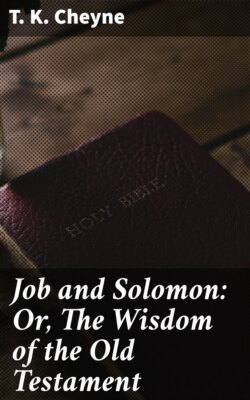Читать книгу Job and Solomon: Or, The Wisdom of the Old Testament - T. K. Cheyne - Страница 3
На сайте Литреса книга снята с продажи.
PREFACE.
ОглавлениеTable of Contents
The present work is a fragmentary realisation of a plan which has been maturing in my mind for many years. Exegesis and criticism are equally necessary for the full enjoyment of the treasures of the Old Testament, and just as no commentary is complete which does not explain the actual position of critical controversies, so no introduction to the criticism of a book is trustworthy which does not repose, and show the reader that it reposes, on the basis of a thorough exegesis. In this volume I do not pretend to have approached the ideal of such students’ manuals as I have described; I have not been sufficiently sure of my public to treat the subject on the scale which I should have liked, and such personal drawbacks as repeated changes of residence, frequent absence from large libraries, and within the last two years a serious eye-trouble, have hindered me in the prosecution of my work. Other tasks now claim my restored strength, and I can no longer withhold my volume from those lovers of the sacred literature who in some degree share the point of view from which I have written.
The Books of Job and Ecclesiastes are treated somewhat more in detail than those of Proverbs and Ecclesiasticus. The latter have a special interest of their own, but to bring this into full view, more excursions into pure philology would have been necessary than I judged it expedient to allow myself. I had intended to make up for this omission so far as Proverbs is concerned at the end of the volume, but have been interrupted in doing so. Perhaps, however, even in the Appendix such detailed treatment of special points might have repelled some readers, and I hope that the Appendix is on the whole not unreadable. The enlarged notes on Proverbs in the forthcoming new edition of Messrs. Eyre and Spottiswoode’s Variorum Bible may enable the student to do for himself what I have not done. As for Ecclesiasticus, the light which Prof. Bickell’s and Dr. Edersheim’s researches are sure to throw on the text may enable me some day to recast the section on this book; at present, I only offer this as an illustrative sequel to the section on Proverbs. It should be added that the canonicity of Ecclesiasticus is handled in conjunction with that of Ecclesiastes at the close of the part on the latter book.
The interest of Job and Ecclesiastes is of a far deeper and more varied kind. Even from a critical point of view, the study of these books is most refreshing after the incessant and exciting battles of Pentateuch-criticism. But as monuments of the spiritual struggles of a past which is not wholly dead, they have been to me, as doubtless to many others, sources of pure delight. If I appreciate Job more highly than Ecclesiastes, it is not from any want of living sympathy with the philosophic doubter, but because the enjoyment even of Scriptures is dependent on moods and impulses. De Sanctis has pointed out (Storia della letteratura italiana, i. 80) how the story of Job became the favourite theme of the early Italian moralists, and everyone knows how the great Latin doctors (Gregory the Great, Bede, Aquinas, Albertus Magnus) delighted to comment on this wonderful book. In our own day, from perfectly intelligible causes, Ecclesiastes has too much drawn off the attention of the educated world, but there are signs that the character-drama of Job will soon reassert its old fascinating power.
In conclusion, will earnest students, whether academical or not, grant me two requests? The first is, that they will meet me with confidence, and gather any grains of truth they can, even where they cannot yield full assent. The problems of Hebrew literature are complex; herein partly lies their fascination; herein also is a call for mutual tolerance on the part of all who approach them. There is nothing to regret in this complexity; in searching for the solution of these problems, we gain an ever fresh insight into facts and ideas which will never lose their significance. My second request is, that the Appendix, which, short as it is, contains something for different classes of readers, may not be neglected as only an Appendix.
I would add that the ‘much-desired aid’ in the critical use of the Septuagint referred to on p. 114 has already to a large extent been given by Gustav Bickell’s essay (see p. 296), which I have now been able to examine. His early treatise (1862) is at length happily supplemented and corrected. We shall know still more when P. Ciasca has completed the publication of the fragments of the Sahidic version. It is clear however that each omission in the pre-Hexaplar Septuagint text (represented by this version) must be judged upon its own merits, nor can I estimate the value of the text of the Septuagint quite as highly as some critics.
It is hoped that the present work may be followed by a volume on the Psalms, the Lamentations, and the Song of Songs.
